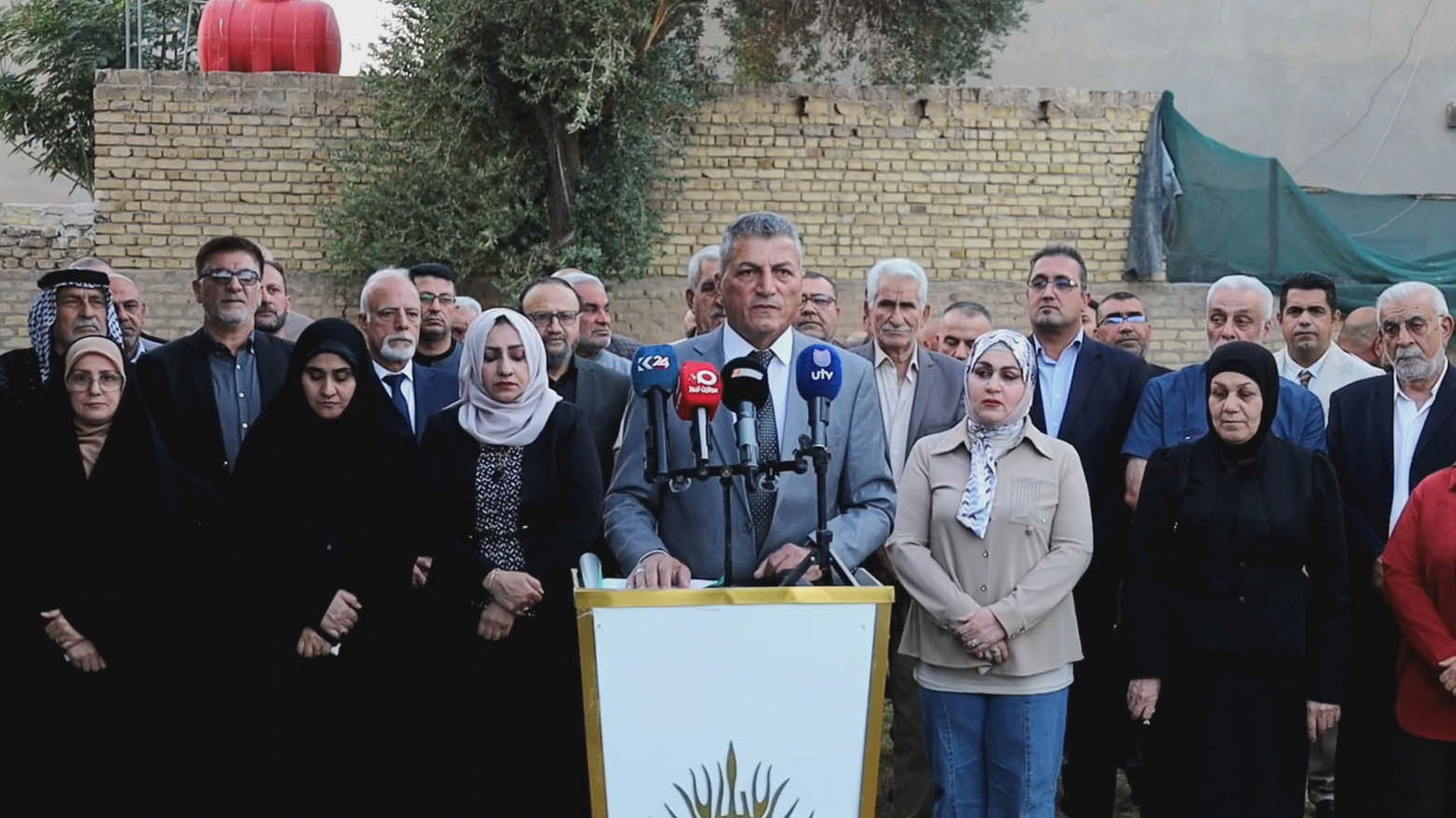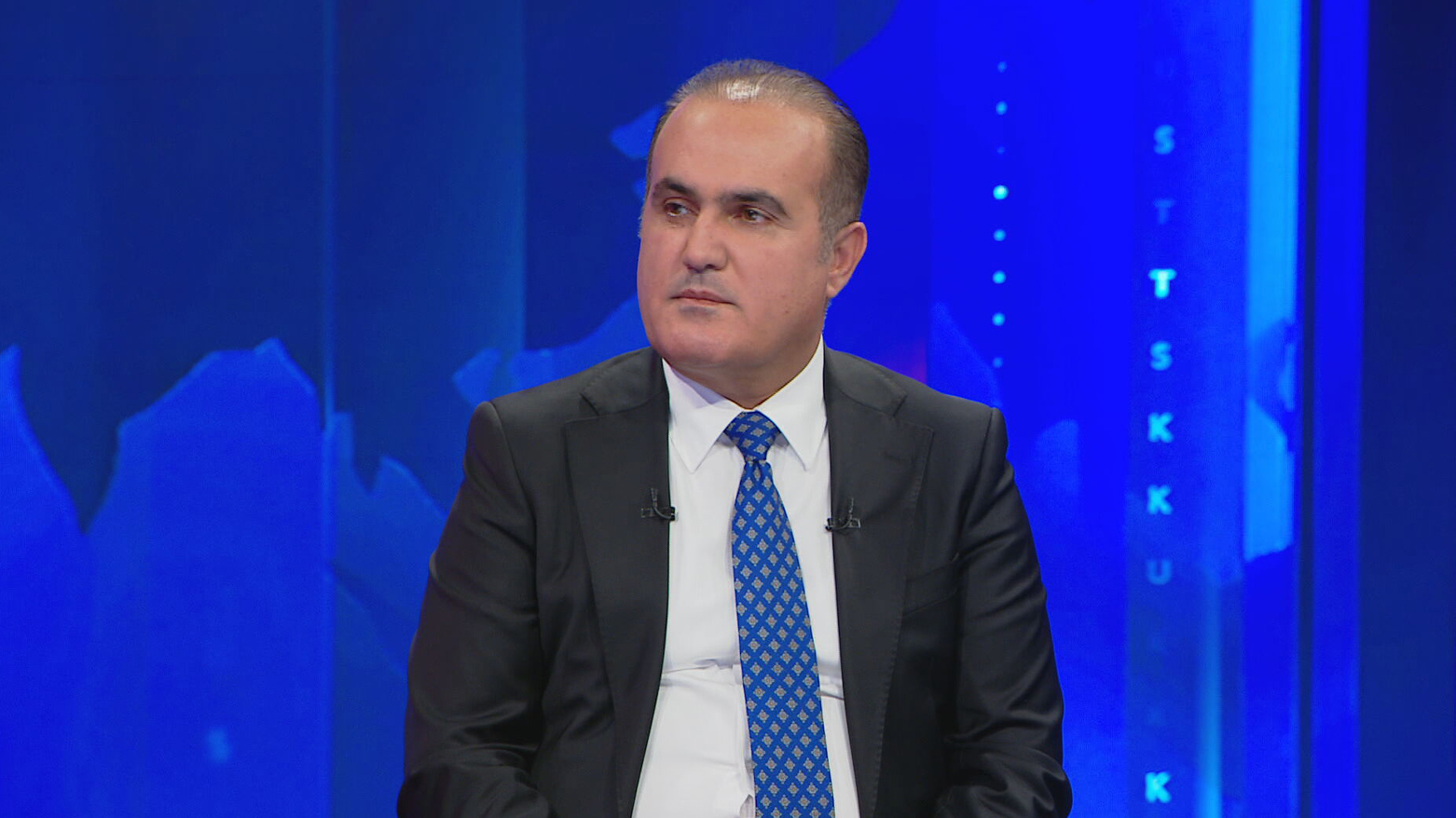Faili Kurds Warn Against Renewed Manipulation of Public Opinion and Reaffirm Their Rights
Faili Kurds condemn former Wasit governor's remarks, vowing to protect their election victory amid fears of quota manipulation in Baghdad.

ERBIL (Kurdistan24) – In a defiant stand against what they describe as historical marginalization and renewed political interference, the tribal leadership and prominent figures of the Faili Kurdish community have issued a stern rebuke to attempts aimed at undermining their electoral achievements. The tension reached a boiling point on Friday, when community leaders convened a high-profile press conference to address and condemn recent statements made by the former governor of Wasit, Muhammad Jamil Mayahi.
The collective message emanating from this assembly was one of unyielding resolve: the victory of their candidate, Haider Abu Tara, in the election for the sixth term of the Iraqi Parliament is a legitimate entitlement that they will protect against any distortion of public opinion or violation of rights.
The controversy centers on the emerging results of the Iraqi parliamentary elections held earlier this month, which have seen a significant shift in the representation of minority components.
The Faili Kurds, a community that has long suffered from political disenfranchisement, rallied behind Haider Abu Tara, securing his victory as their representative. However, this success has drawn critical commentary from former Governor Mayahi, prompting a swift and unified response from the Faili leadership.
During the press conference, tribal heads questioned the legitimacy and authority of the former governor to speak on matters concerning their community.
They characterized his intervention not merely as an external critique, but as an affront from a figure with a history of detrimental actions against them. The leaders pointedly asked who had authorized Mayahi to act as a spokesperson for their interests, reminding the public that he was, in their view, the first person to violate the rights of the Faili Kurds during his tenure.
They specifically cited his decision to retract several administrative posts that had been allocated to the community, including the position of assistant to the governor of Wasit, which they view as a rightful election entitlement that was stripped away.
A central theme of the press conference was the legal and logistical nature of the minority quota system in Iraq. The Faili representatives emphasized a crucial point regarding electoral law that appears to be at the heart of the dispute: the quota seat for the Faili Kurds is designated for the entirety of Iraq, spanning from the northern provinces to the south.
Consequently, they argued, it is legally unsound and politically unacceptable to suggest that votes for the quota candidate should be restricted to a single governorate. They reiterated that for the purpose of voting for quota seats, the entire nation of Iraq is treated as a single electoral district.
This clarification serves to debunk arguments suggesting that the Faili seat belongs inherently to the local administration of Wasit or is subject to its specific provincial dynamics.
The tribal leaders also used the platform to air grievances regarding the political history of the past two parliamentary terms. They noted that for the past eight years, the quota seat ostensibly allocated for their representation in Wasit governorate had been "seized," resulting in the deprivation of the Faili Kurds' genuine political voice.
The recovery of this seat in the recent election, they suggested, has disrupted the status quo and "annoyed" certain political parties that had grown accustomed to controlling this mandate. The leaders accused these disgruntled parties of making mistakes and actively working to distort public opinion to delegitimize the Faili victory.
This localized dispute in Wasit is symptomatic of a broader, more insidious struggle unfolding in the Iraqi capital, Baghdad.
According to political analysts and election experts, there is a concerted effort by various political factions to alter the electoral map following their defeat at the polls. Hawar Muhammad, a noted expert on Iraqi elections, spoke exclusively to Kurdistan24 to shed light on the mechanics of this manipulation.
He warned that several parties in Baghdad are currently attempting to tamper with the election results and the quota seats won by various components, engaging in maneuvers to change the political landscape even if it requires bypassing legal standards.
Hawar Muhammad explained the driving force behind these desperate measures. "Those parties that consider themselves defeated, especially those who could not win the quota seats, are making serious efforts to, by any means, make changes in that political map which has been created in Iraq, especially within the framework of the components' quota seats," he told Kurdistan24.
The motivation for this interference is deeply rooted in the customs of Iraqi government formation. Muhammad detailed that, according to a prevailing legal custom in Iraq regarding the distribution of ministries, any party that manages to obtain three seats—particularly within the minority components—can effectively secure a ministerial portfolio for itself.
This custom has turned the quota seats into highly prize commodities. "This has become a problem, especially for those parties that previously obtained the quota seat unjustly," Muhammad noted.
The election expert elaborated that the parties who have now lost their grip on the component quota seats are finding that their remaining seat count is insufficient to guarantee a ministry. Consequently, they are "very worried about the results" and are resorting to attempts to reclaim these seats, even through illegal means, to reach the threshold required for executive power.
Muhammad also drew a chilling parallel to the events following the 2021 elections, warning that history risks repeating itself.
"Constantly in Iraq, sudden and rapid scenarios and possibilities are at play," he said. He recalled how, in the previous election cycle, a scenario was manufactured where the appeal period was extended via a republican decree.
The result of that legal maneuvering was the usurpation of two seats that had been won by the Kurdistan Democratic Party (KDP). "Now too the same possibility exists and several parties are attempting to change the results even if by illegal means," he cautioned.
The threat of manipulation is not limited to the Faili Kurds but extends to other minority components, including Christians and Turkmens, drawing high-level concern from the Kurdistan Region’s leadership. The Kurdistan Democratic Party (KDP) has been vocal in its opposition to these tampering attempts.
Hawar Muhammad mentioned that the KDP has spoken out at the highest levels. Masrour Barzani, the Deputy President of the Party, alongside the KDP Political Bureau, has issued separate condemnations of these attempts, announcing unequivocally that they will not accept such violations in any way.

This aligns with a firm warning issued by the KDP just hours prior regarding covert attempts to manipulate Christian and Turkmen quota seats. The party declared that any effort to undermine the will of the components would not be tolerated. This stance comes in the wake of the sixth Iraqi parliamentary elections held on November 11, 2025, which marked a significant turning point for Christian representation.
Despite immense pressure from armed groups and entrenched political networks, Christian voters successfully elected independent representatives, rejecting figures affiliated with militias.
For years, the Christian quota seats had been dominated by factions largely tied to armed groups, such as those linked to Rayan al-Kildani, who utilized these seats for political leverage rather than genuine community representation.
The initial results of the recent election signaled a rejection of this imposition, with independent candidates Sami Oshana winning in Duhok, Aldo Ramz in Erbil, and Imad Youkhana in Kirkuk. Observers have described this shift as a major awakening of Christian political awareness.
However, just as the Faili Kurds face challenges in Wasit, the Christian and Turkmen representatives face threats in Baghdad. The KDP’s firm stance reflects accumulated concerns, particularly following the Iraqi Federal Court’s previous decision to reduce the number of component seats in the Kurdistan Parliament from 11 to 5—a move widely criticized as unfair and politically motivated.
The fear now is that similar judicial or administrative interventions could be used in Baghdad to reverse the democratic gains made by these communities.
The KDP has insisted that it will counter any unlawful effort to install individuals aligned with external agendas or armed groups at the expense of genuine minority representatives. As political negotiations intensify in the capital, the situation remains fluid.
The convergence of the Faili Kurds' defiance against local governors and the broader struggle to protect Christian and Turkmen seats highlights a critical test for Iraqi democracy: whether the independent will of its diverse components will be respected, or if the political elite will once again distort the results to maintain their grip on power.